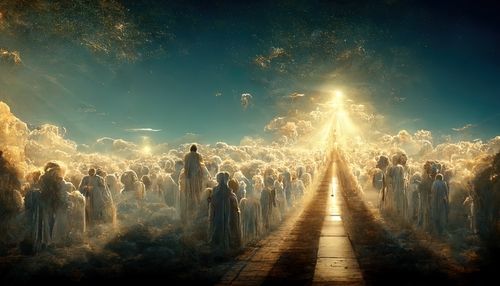In today’s fast-paced world, the notion of death often induces trepidation and anxiety, yet within the Baha’i faith, one can find a remarkably gleeful perspective on this indubitable aspect of life. Have you ever pondered what it might mean to embrace the end of life with open arms? In Baha’i teachings, the journey towards the afterlife is not a fearful descent into the unknown but a glorious transition towards the fulfillment of our spiritual potential.
The Baha’i worldview posits that life on Earth serves as a preparatory stage for the spiritual existence that follows. Central to this belief is the idea that our actions and deeds during our mortal existence contribute to our development in the next world. Consequently, the anticipation of death is not laden with despair but rather colored with enthusiasm for the spiritual adventure that awaits. This outlook invites us to consider a playful challenge: how can we cultivate a perspective on death that resembles more of an opening of a door than an end?
Baha’u’llah, the founder of the Baha’i faith, elucidates that death is a portal, a threshold between the physical and the spiritual realms. This perspective is deeply entrenched in the belief that the soul is eternal, an entity that transcends the corporeal confines of the human experience. This underpinning of the Baha’i doctrine encourages members of the faith to engage in a continuous journey of self-reflection and spiritual growth, cultivating virtues such as love, kindness, and compassion. The question arises: how does one prepare for such a transition, and what life practices can be implemented to foster readiness?
To adequately prepare for the afterlife, Baha’is are encouraged to live lives filled with purpose and service. One of the paramount principles of the Baha’i faith is the idea of serving humanity. Acts of service are not simply duties; they are viewed as essential components of personal development. By aiding others, individuals not only contribute positively to the world but also enrich their own souls. Wouldn’t it be fascinating to view every act of kindness as a gift that enhances the brightness of our eternal journey?
Moreover, Baha’i teachings emphasize the importance of cultivating an inner life through prayer and meditation. These practices are foundational in fostering a deep connection with the Divine and nurturing one’s spiritual faculties. Baha’is engage in daily prayers, which are considered vital in aligning themselves with God and the spiritual realities that govern life. Through prayer, individuals seek enlightenment, guidance, and a tranquil heart. Consequently, a life steeped in spiritual practices naturally leads one to a state of readiness and acceptance of death.
Furthermore, the Baha’i understanding of the afterlife encourages individuals to confront their deepest fears surrounding mortality. The teachings convey that the soul’s continuation is assured, fostering a sense of reassurance about what lies beyond death. This divine assurance allows Baha’is to shun fear and instead embrace the prospect of the afterlife with a joyful heart. What if we approached life with the awareness that we are mere transitory beings, here with a purpose, impacting others and preparing for a future beyond this existence?
A pivotal aspect of the Baha’i view on life and the afterlife is the concept of individual accountability. In the Baha’i tradition, it is taught that each individual is responsible for their choices and actions. The idea that our deeds echo in the afterlife is a powerful motivator for personal conduct. It prompts a self-examination that allows one to ensure that the life they lead is commendable and conducive to spiritual elevation. Herein lies another challenge: can we strive each day to live authentically, ensuring that our lives reflect our highest spiritual aspirations?
Furthermore, the emphasis on the unity of humanity within Baha’i teachings reminds adherents that graceful acceptance of the life cycle contributes to a broader understanding of existence. This interconnectedness fosters compassion and empathy, essential virtues that guide Baha’is in their interactions with others. Seeing life and death as shared experiences allows Baha’is to form deeper relationships and nurture communities that thrive on mutual respect and understanding. Thus, the question arises: how can we, too, foster connections that transcend beyond the superficial, engaging with the profound aspects of life and death together?
As one delves deeper into Baha’i perspectives on the afterlife, it becomes evident that such teachings extend beyond philosophical musings; they spawn practical applications that ensure a life well-lived. By embodying virtues, engaging in acts of service, committing to prayer, and embracing the belief in the permanence of the soul, individuals can navigate life’s complexities with grace and fortitude. Ultimately, the teachings present a roadmap increasingly relevant in a contemporary world awash with uncertainty.
In summary, the Baha’i perspective on death and the afterlife is not one of dread but of joyous anticipation. The teachings encourage individuals to prepare for their inevitable passage with courage, compassion, and a commitment to personal growth. By viewing life as a precious opportunity to develop spiritually and serve humanity, one can joyfully embrace the concept of death not as an end, but as a transition. So, how will you choose to prepare for that journey—will you welcome it with open arms, ready to explore the profound mysteries that lie beyond?
